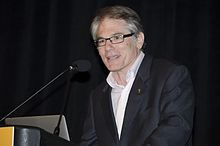| Eugene Myers | |
|---|---|
 Myers speaking at ISMB 2014 Myers speaking at ISMB 2014 | |
| Born | Eugene Wimberly Myers (1953-12-31) December 31, 1953 (age 70) Boise, Idaho, U.S. |
| Alma mater | University of Colorado at Boulder Caltech |
| Awards |
|
| Scientific career | |
| Fields | Computer science Bioinformatics |
| Institutions | MPI-CBG Janelia Farm Research Campus University of Arizona |
| Thesis | A Depth-First search characterization of K-connectivity and its application to connectivity testing (1982) |
| Doctoral advisor | Andrzej Ehrenfeucht |
| Website | www |
Eugene Wimberly "Gene" Myers, Jr. (born December 31, 1953) is an American computer scientist and bioinformatician, who is best known for contributing to the early development of the NCBI's BLAST tool for sequence analysis.
Education
Myers received his Bachelor of Science in mathematics from the California Institute of Technology and a Doctor of Philosophy in computer science from the University of Colorado.
Research
Myers' 1990 paper (with Stephen Altschul and others) describing BLAST has received over 62,000+ citations making it amongst the most highly cited papers ever. Along with Udi Manber, Myers invented the suffix array data structure.
Myers was a member of the faculty of the University of Arizona, the Vice President of Informatics Research at Celera Genomics, and a member of the faculty at UC Berkeley. At Celera Genomics, Myers was involved in the sequencing of the human genome, as well as the genomes of Drosophila and mouse. In particular, Myers advocated the use of the whole genome shotgun sequencing technique. Later, he became group leader at the Janelia Farm Research Campus (JFRC) of the Howard Hughes Medical Institute. In 2012, Myers moved to Dresden to become one of the directors of the Max Planck Institute of Molecular Cell Biology and Genetics. He leads a center for systems biology.
Myers' current research interests include computational reconstructions of neuroanatomical data, algorithms for analysis of functional neuroscience data, and genome assembly. Among his latest contributions is FASTK, a highly optimized kmer counter for high-fidelity shotgun read datasets.
Myers was voted the most influential in bioinformatics in 2001 by Genome Technology Magazine and was elected to the National Academy of Engineering in 2003. In 2004, together with Martin Vingron, Myers was awarded the Max Planck Research Prize for international cooperation in bioinformatics. He was awarded the ISCB Accomplishment by a Senior Scientist Award for outstanding contribution to bioinformatics, in particular his work on sequence comparison algorithms.
Awards and honours
- 2022: IEEE Frances E. Allen Medal (with Webb Miller)
- 2019: Milner Award by the Royal Society
- 2014: Accomplishment by a Senior Scientist Award by the International Society for Computational Biology
- 2004: International Max Planck Research Prize
- 2003: Elected Member of the National Academy of Engineering.
- 2001: Paris Kanellakis Award by the Association for Computing Machinery
References
- ^ Fogg, C. N.; Kovats, D. E. (2014). "2014 ISCB Accomplishment by a Senior Scientist Award: Gene Myers". PLOS Computational Biology. 10 (5): e1003621. Bibcode:2014PLSCB..10E3621F. doi:10.1371/journal.pcbi.1003621. PMC 4031058. PMID 24853264.
- Eugene Myers at the Mathematics Genealogy Project
- Altschul, S.; Gish, W.; Miller, W.; Myers, E.; Lipman, D. (1990). "Basic Local Alignment Search Tool". Journal of Molecular Biology. 215 (3): 403–410. doi:10.1016/S0022-2836(05)80360-2. PMID 2231712. S2CID 14441902.
- Eugene Myers publications indexed by Google Scholar
- Manber, U.; Myers, G. (1993). "Suffix Arrays: A New Method for On-Line String Searches". SIAM J. Comput. 22 (5): 935–948. CiteSeerX 10.1.1.105.6571. doi:10.1137/0222058. S2CID 5074629.
- Gene Myers' Home Page
- "Eugene Myers will lead new Systems Biology Center". Max Planck Society. Retrieved 12 October 2012.
- Twitter feed
- "GitHub - thegenemyers/FASTK: A fast K-mer counter for high-fidelity shotgun datasets". GitHub. Retrieved 2021-08-27.
- "2004 Max Planck Research Prize for Martin Vingron and Eugene W. Myers". www.mpg.de. Retrieved 7 September 2016.
- "Gene Myers and Dana Pe'er Named 2014 ISCB Award Winners". www.iscb.org. ISCB. Retrieved 24 January 2014.
- "Current IEEE Corporate Award Recipients". IEEE Awards. Retrieved 2021-11-29.
- "Milner Award". Royal Society. Retrieved 6 September 2018.
| Winners of the Paris Kanellakis Theory and Practice Award | |
|---|---|
|
| Fellows of the International Society for Computational Biology by year of election | |
|---|---|
| 2009 | |
| 2010 | |
| 2011 | |
| 2012 | |
| 2013 | |
| 2014 | |
| 2015 | |
| 2016 | |
| 2017 | |
| 2018 | |
| 2019 | |
| 2020 | |
| 2021 | |
| 2022 | |
- Living people
- 1953 births
- American bioinformaticians
- California Institute of Technology alumni
- Human Genome Project scientists
- University of Colorado alumni
- University of California, Berkeley faculty
- University of Arizona faculty
- Fellows of the International Society for Computational Biology
- Max Planck Institute directors